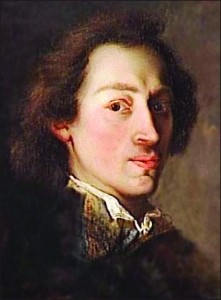WARSAW, Poland – The last piano that Frederic Chopin composed on. A death mask made after he succumbed to what was probably tuberculosis. A lock of his brown hair.
Those are among objects on display at a new museum dedicated to the life of the Romantic-era composer that opened on his 200th birthday Monday in his native Poland.

The interactive multimedia museum is located in the center of Warsaw, where Chopin moved in infancy from a nearby country estate, and where he spent the first 20 years of his life before moving to Paris.
Culture Minister Bogdan Zdrojewski hailed it as “the most modern biographical museum in Europe and even the world” at a ceremonial opening that comes amid a year of celebrations of the much-revered musician.
A central challenge that curators faced is the loss of many objects related to Chopin’s life. Some, like letters, were destroyed by women he was romantically involved with; others were consumed in the devastation of World War II.
Polish authorities began gathering musical scores, sketches and other objects tied to Chopin in 1899 and are still pursuing them at auctions around the world, curator Alicja Knast said.
“They are priceless in terms of emotional value,” she said.
The museum is arranged thematically with spaces devoted to different aspects of his life.
A room devoted to Paris salon life features Chopin’s last piano, built by the prominent piano maker Ignace Pleyel. Visitors learn that Chopin earned his living in Paris by giving lessons — he was a much-prized teacher and one of the city’s most expensive.
Another room is devoted to the time he spent at Nohant, the French chateau that belonged to his companion of eight years, writer Aurore Dupin — best known by her nom de plume George Sand.
The room is filled with the sound of chirping birds, meant to evoke the natural setting of the place where Chopin composed some of his masterpieces.
On display is a kerchief of white damask on which Sand embroidered Chopin’s initials. Visitors can pull out slabs labeled with the names of works composed at Nohant, triggering recordings of the pieces.
The final room is devoted to his death at age 39 on Oct. 17, 1849. A dark space bereft of the music filling most of the museum, it includes a plaster death mask taken of Chopin’s face. On display are also invitations to his memorial service in Paris, as well as a lock of his brown hair safeguarded by his family.
The museum is housed in the stately Ostrogski Palace, home of the Fryderyk Chopin Institute, which underwent major renovation and expansion to house this revamped museum.
Tickets cost 22 zlotys ($7.50) and must be reserved over the Internet or purchased in advance at the museum.










